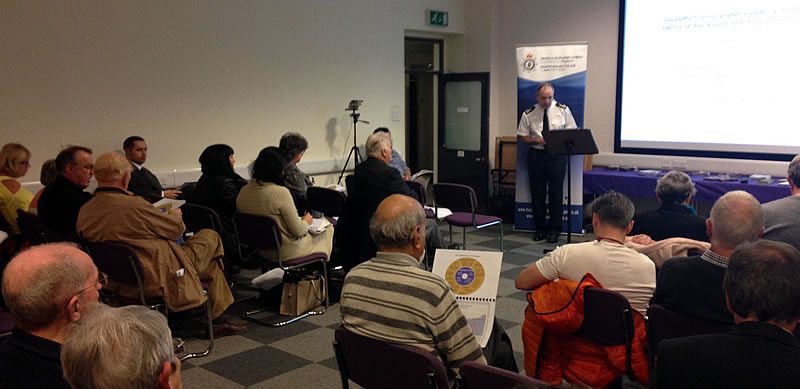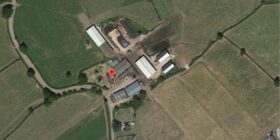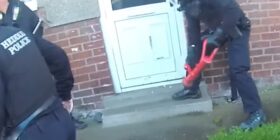Chief Constable: Police Will Hit Low Level Drug Dealers in Wrexham – Asks Councillors To Play Their Part

A consultation meeting on high level crime plans took the form of a direct Q&A session with the Chief Constable over local drug problems.
Last night Arfon Jones, the North Wales Police and Crime Commissioner (PCC) and North Wales Police’s Chief Constable Mark Polin held an open meeting at Wrexham Glyndwr University over the Police and Crime Plan for North Wales.
The agenda was largely bypassed with the ongoing drug and antisocial behaviour issues in certain parts of Wrexham dominating the discussion, with several very angry current and ex-councillors and some local residents raising the issue.
Councillor I David Bithell, local member for the Stansty ward raised a point he has made previously in the Guildhall regarding the lack of a dedicated ‘drugs squad’ in Wrexham to tackle what he called the ‘escalating drugs problem’ in the area.
Chief Constable Polin gave detail of the ‘priority crime team’ in Wrexham where resources are allocated depending if it is deemed a threat is significant, which has to be balanced across the entire resources of the force.
North Wales Police resources could be cut further, with financial information disclosed of the previous five years of cuts totally £27m with around £4.5m more certainly due to come, with the direct impact on the frontline of reduced PCSOs and therefore coverage on the beat.
The meeting was presented with a pack of slides demonstrating how policing is now focussed towards non-street crime, with cybercrime being an example of high tech investment by the force with ‘more crime online than on the streets’.
Interesting slide on a typical day in North Wales… pic.twitter.com/7QFscUf4DB
— Wrexham.com (@wrexham) November 14, 2016
In the context of the local anti social behaviour and drugs related issues there was a stark contrast between what the Chief Constable and PCC had as priorities and those in the audience felt they should be.
Councillor Phil Wynn spoke of how he was fully supportive of the child protection work by North Wales Police and the diminishing resources and demands placed on the force, but was clear that antisocial behaviour and drugs were ‘the issue of the day’.
Councillors Steve Wilson and Phil Wynn spoke of the issues mentioned last week in Rhosddu, referring to the PCC’s predecessor who had told them ‘little fish’ drugs offences were of no interest to him and how that needed to change with the new(ish) PCC.
PCC Jones said as a local person he saw the issues on a day-to-day basis, observing: “One agency we have not talked about that is responsible for dishing out the needles in the town is the health board. There should be a system in place where if you are dishing the needles out there should be a place where they can be collected, or used safely.”
Chief Constable Polin commented: “We will not arrest our way out of this. This requires a joint response. It is not the police’s job, it is not your job or kids job to collect needles but it should be someones job. There seems to be no coming together over the issues, that is unacceptable.”
Councillor Malcolm King spoke in detail and at length over drug issues and their impact, calling MP’s and AM’s ‘spineless’ for ‘not recognising there has to be some kind of management of this, rather than just treating often really pathetic or sad people as criminals’.
Councillor King added: “I have a ward full of people in despair as all they see is blatant drug dealing. You would not have to have any detective skills higher than a five year old to see it. Daddy, I am only five but why are there thirty people an hour calling of a Friday evening at that house? This does not need any policing skills whatsoever to work out what is going on.”
A meeting at Wrexham Council’s own Crown Buildings was referenced with staff members saying they had reported drug use and dealing many times with the feedback apparently given of ‘if we arrest them they will just move on somewhere else’. Later the meeting was told only one report, relating to alcohol, had been received.
A dispute over the reporting of crimes took place, with Councillor King and others stating that reports were being made of crimes, sometimes involving detailed logging by concerned resident.
Chief Constable Polin requested more intelligence to be fed to the police, and invited logs and reports to be shared. Later in the meeting one audience member related how they had tried to call police via the 101 number, yet after 20 minutes of no reply had given up.
Councillor King suggested a more hands on approach inviting police to observe properties saying ‘you would have to be completely braindead not to see what is going on’, adding: “It cannot be due to lack of intelligence, there are hundreds of drug offences taking place in my ward everyday right in front of everybody’s faces. Public confidence is rock bottom.”
Chief Constable Polin asked the on the whole Councillor based audience to encourage their communities to report crimes to the police. He said: “I get your point Malcolm that you are seeing it, but you are probably more attuned to it as it is on your doorstep. Whatever you can do to convey information to us will be appreciated.”
Councillor King replied saying people with ‘close relationships’ with police had kept logs, phone through details and pass information, noting: “It is not acceptable to say the information is not getting through, I know it is.”
Chief Constable Polin invited Councillor King to liaise with the town’s Inspector to ensure logs and information were being passed over. Councillor King said he had been doing such things over the past years.
He added: “Some of the major drug dealers, that everybody knows who they are, are still doing exactly the same thing. This is after I have said who it is, they know their names and address. The only conclusion I can come to is it is a too lower of a priority for the police to deal with it.”
Councillor Powell accused Chief Constable Polin of ‘smoke and mirrors’ with his presentation saying various areas of concern were being dealt with by other agencies such as the National Crime Agency.
Councillor Powell also called the policing model dated, saying it used a 1970s model of resource of deployment: “You as Chief Constable need to give Wrexham the resources it needs. The deployment of Officers is a 60’s / 70’s model, and we are not there anymore.”
Chief Constable Polin fired back strongly, stating it was not smoke and mirrors with a detailed explanation on how North Wales Police deal with crime at a high level, which despite being serious and specialised is not of a level to warrant NCA involvement.
Chief Constable Polin also firmly disputed the claim of a 1970s approach to policing, adding Wrexham gets more resources than the western area of the force.
So far Councillors asking questions, well absolutely hammering lack of action on drugs in Wrexham more like. Strong stuff. (The Q’s that is)
— Wrexham.com (@wrexham) November 14, 2016
After several questions from Wrexham Councillors Chief Constable Polin said: “I am getting a bit tired of Councillors blaming the police for issues, and referring them to our 101 system, when it seems to me you are not equipped, or not prepared to raise those concerns with your own body and you ought to start turning your attention to doing so.
“Because if you take some of the representations and concerns you are expressing here with the appropriate agency, bearing in mind we cant enforce our way out of it, it would be some of your local authority officers.”
The PCC added that Wrexham Council could play their part by exercising their powers over antisocial behaviour an looking to evict anti-social tenants or those who deal drugs. He said: “If they behave antisocially or criminally, then the Council have got powers to evict them.”
Resident’s stories were relayed from Rhosddu and other areas of Wrexham, including one audience member saying police were in his view a ‘soft touch’ after he saw PCSOs not crossing the road to investigate an ‘obvious drug deal’.
Another told of how a resident had to give up employment to make sure they could safely take their children to school.
The PCC was heckled when he said the issues were ‘certainly being taken on board and would be looked at’, with a shout of ‘Stop looking, take action!’.
Councillor Brian Cameron spoke of wanting more of a joined up approach, pointing out that the issues related from Rhosddu and Caia were not limited to that area alone. He said: “It is right across the borough. It needs a coordinated approach to how it is dealt with.”
Speaking of how previously public meetings helped highlight and then deal with problems he added: “When people are together they speak, they point the fingers and told people what was going on. It is about having more public meetings, working together you will see some results.”
Chief Constable Polin concluded saying he would ensure that North Wales Police would review their contribution to the Councillors ‘action plan’ (our report on that meeting is here) as he did not wish to be ‘silent’ on the matter.
He said: “From that though I would want to know the local authority are playing their part too. We will also have to work out how we will get significant buy in from other partner agencies, this should not be a finger pointing exercise, but they ought to be in the room.”
Chief Constable Polin also said that police would be ‘taking a look at the intelligence picture’ with a view to taking more direct action, although did point out that if the intelligence flow was not there to enable such action he would be looking for help to ‘unblock that blockage’.
“I will takeaway the fact of what I am hearing, and what we heard last week, we are going to have to consider what else we can do to hit some of the low level drug dealers that are not being hit, certainly in your eyes.”
Police & Crime Commissioner Details ‘Fix Room’ Policy
This morning the public relations company employed by the office of the PCC circulated a release giving further details to one solution offered by the PCC last night based on a model of a scheme in Glasgow.
The release read: “Used in some European cities, the safer consumption facility and treatment service was recommended by the Glasgow City Alcohol and Drug Partnership. It will involve NHS staff but the location of the centre and its cost are still to be established, although advocates say analysis of other units “have demonstrated their cost effectiveness from a societal perspective”.
Similar schemes operate in 10 other countries, including Australia, Germany, France, Holland and Switzerland.”
The PCC added: “At the moment, all you’re getting is the authorities treating the symptoms of substance abuse and drug addiction rather than the underlying causes. Drug addiction should be treated as a public health issue rather than as a criminal matter
“The problem we have in Wrexham is that all the services are concentrated on the edge of a residential area, so the problems are arising out of people seeking advice and services. Clearly, one of the issues for the people of Rhosddu, and I well understand their concerns, is the amount of discarded needles everywhere.
“If we had what we call a fix centre, where they could go and safely inject or take their drugs, then that problem would disappear overnight.
“We should do something like they do in Glasgow and set up a fix room where addicts can go and they can inject the substances. The facility would offer additional ‘wrap around’ services on the same premises such as health care, counselling, and housing and welfare advice Something else we need to look at is heroin assisted treatment which is a tried and tested system in this country. Heroin has been prescribed in the UK since 1926. It’s nothing new.
“Heroin-assisted treatment (HAT) would be available for the most chaotic users, who have exhausted other options such as methadone or rehab. The heroin would be prescribed in the same way a physician would prescribe methadone, which is actually more addictive than heroin. It is medicinal heroin, so it is clean and users do not face the risk of taking a contaminated drug, like they would if they bought it on the street. The rooms would also provide clean injecting equipment.
“The other benefit of this approach is that it would address the problem of open low-level dealing on the streets of Wrexham because prescribing heroin would take it away from criminal elements.”
Possibly coincidental timing, or a public show of a crackdown starting there were two related tweets from North Wales Police accounts this morning:
Foot patrol this morning from 08:30 in the Rhosddu area of Wrexham, park all clear, no PSPO breaches, tickets stayed dry! @NWPWrexhamTown
— Rees Ackland (@NWPPCSOAckland) November 15, 2016
Male arrested this morning for being concerned in the supply of controlled drugs @wrexham #YouSaidWeDid
— NWP Insp S Kneale (@NWPInspKneale) November 15, 2016
Spotted something? Got a story? Email [email protected]












